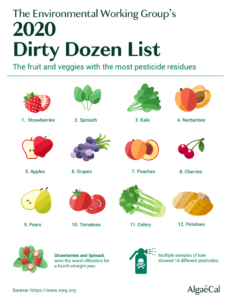Today, I want to talk about eating organic. Maintaining a healthy, balanced diet free from toxins is so important to preventing chronic health issues and living a long, gorgeous life!
My number one reason to start eating organic is because it reduces your exposure to pesticides, herbicides and fungicides. These chemicals sprayed onto crops are designed to kill. Sure, pesticides get rid of the bugs and critters we don’t want in and on our food, but that poison can also make its way into nature – our food, our water, our air, and our bodies—and wreak havoc on our health and ecosystem.
Let’s take a look at apples, for example. What’s more classic Americana than warm apple pie? Well, according to the USDA Pesticide Data Program, conventional apples contain 47 pesticide residues, including 6 known or probable Carcinogens, 16 suspected Hormone Disruptors, 5 Neurotoxins, and 6 Developmental or Reproductive Toxins. Suddenly, that apple pie doesn’t seem so sweet.
The Dirty Dozen
Last week, I talked about the Environmental Working Group’s Dirty Dozen list, which consists of the twelve types of produce that retain the most pesticides. Apples are always on this list, but they aren’t even number one. When you switch from conventional non-organic produce to organic the decrease in average and maximum amounts of pesticide residue is staggering. In just apples alone, and the widely-used pesticide Diphenylamine (DPA), check out the difference in the chart below. In fact, Europe has banned the import of U.S. apples because they are so coated in DPA.
Oh, and here’s just a few of the known chemical-related illnesses that can develop from pesticide exposure:
• Multiple types of cancer
• Leukemia
• Brain tumors
• Parkinson’s disease
• Birth defects
• Impaired neurological development
• Endocrine disruption
Fantastic list, right? The effects of these type of chemicals will always be linked to increased incidence of chronic disease. We all don’t have an Erin Brokovich to fight for our health, so it’s up to us to start (and continue) to make better choices about the food we eat, and the companies we support.
The Evil Elephant In The Room
We cannot talk about pesticides without touching on Monsanto, the behemoth multinational agrochemical and agricultural biotechnology corporation. This American company is the leading seed supplier in the world. Their main products include genetically engineered (GE) seeds (like corn, soybean, cotton, wheat, canola) and the popular gardening herbicide Roundup.
As a strong advocate for eating organic whenever possible, I am not a fan of this company and its ilk. It’s very counterintuitive to poison something we are going to eat, but that is what often happens in the name of cutting corners, saving time and maximizing profits. “Agriculture, food, and related industries contributed $992 billion to U.S. gross domestic product (GDP) in 2015,” according to the USDA Economic Research Service, so it is without a doubt big business. According to Monsanto’s chief technology officer, Robb Fraley, “15 years ago, Monsanto invested $300 million in research and development; this year [2016] it has invested $1.5 billion.”
Monsanto disguises themselves as a food producer, when they are actually a chemical company. You’ve probably heard the expression, “Better living through chemistry,” well, Monsanto takes that concept to another, disturbing level. The marketing spin is that if they can make more food faster, with less bugs, then they can feed more people. However, their rampant use of chemicals actually does more damage to people on the back end.
What is the real cost of NOT eating organic?
When you take a look at the bigger picture, the hidden costs of industrial agriculture come out of our health, safety and the life of our planet. Our government subsidizes the seven biggest ingredients in fast foods and processed foods. These are corn, soybeans, wheat, rice, sorghum, milk and meat. At one time in history this was a practice important to stabilize the farming industry. Now? It mainly contributes to our country’s junk food addiction, extra LBs, chronic diseases and hefty doctor bills.
I know that most people automatically think that going organic means spending more money, but that isn’t always the case. Believe me, I’ve done my price comparisons and more often than not, the prices are pretty damn close.
But is you’re looking even more encouragement, check out Moniqua Plante Wellness Guide to Going Organic for my favorite ways to go au naturale without breaking the bank!
Eating organic? Your food lasts longer.
Organic produce, especially if you buy it at your local farmers market, can last two or more weeks in your fridge, if you store it correctly. You can certainly find organic produce in almost every major grocery chain now, but nothing beats going directly to the source (the farmer)! Check out this article for the sad life of a traveling apple.
Get Educated
You don’t have to buy everything organic! If you do fill your fridge from the grocery store, be sure to refer to the EWG’s Clean Fifteen list for the produce with the least amount of pesticide residue. Foods with heavy peels like melons or avocados are a good bet. Also, food wrapped in thick outside leaves you usually discard like cabbage, corn (non-GMO) and cauliflower are pretty safe.
Plus, when you know more about the harmful effects of industrial farming on our health and environment, you’ll find a deeper appreciation for even the act of cooking and eating. And you know I am all for the extra self care!
Shop Like A European
You don’t need a Costco sized bag of lemons when you’re just one person. So get into the habit of shopping each week at your local farmers market and just getting what you need for that week. I love to plan my menu ahead of time, so I only buy what I know I need. Plus, you’re not dumping wasted food in the trash because you’ve bought too much and it didn’t last long enough.
Better For Your Belly
Organic food at a farmers market will be in season, so it will be in sync with our bodies at the time of year that we’re consuming them—fruits that cool your body in the summer like watermelon and root veggies for stews and warming meals in the winter. In turn, our bodies will process our food better.
Go Halfsies with Your BFF
If you don’t have time to hit up a farmers market, I don’t believe you. (Just kidding!) But honestly, especially if you live in a major city, there is probably one open every day of the week. Another option though is to join a CSA (Community Supported Agriculture) and split a box of organic fruits and veggies with one or two of your best buds. You get all the benefits of a trip to the farmers market, customized and delivered to your front door. Plus, it is affordable!
What’s your favorite thing about eating organic? What’s your big worry about making the switch from conventional produce? Let me know in the comments below.
–
LOVE + organic greens!


+ show Comments
- Hide Comments
add a comment